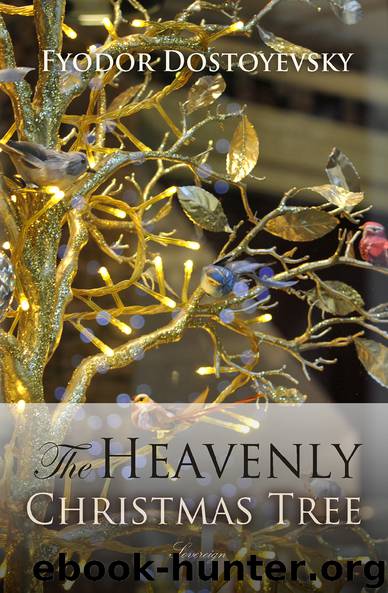The Heavenly Christmas Tree and Other Stories by Fyodor Dostoyevsky

Author:Fyodor Dostoyevsky
Language: eng
Format: epub
Tags: Do we understand the true meaning of Christmas? Dostoyevsky invites us to follow the story of a 6 year old boy trying to survive on a cold winter day. Other stories in this collection include: The Peasant Marey, The Crocodile, Bobok, The Dream of a Ridiculous Man.Born in Moscow in 1821, Foydor Dostoyevsky is considered to be one of the greatest and most prominent psychologists in world literature. Dostoyevsky was incarcerated in 1849 for being part of the liberal intellectual group the Petrashevsky Circle. He also suffered from an acute gambling compulsion. Crime and Punishment was completed in a mad hurry because he was in urgent need of an advance from his publisher. Motivated by the dual wish to escape his creditors at home and to visit the casinos abroad, Dostoyevsky travelled to Western Europe in 1862. He visited France, Germany, Switzerland, Italy, and England. In London he attended the 1862 World's Fair and had a first-hand look at the Crystal Palace, the architectural wonder of the age. The image of the Crystal Palace, which for progressive critics symbolized the dawning of a new age of reason and harmony, was to loom large in Dostoevsky's works to come, especially Notes from Underground and Crime and Punishment.Dostoyevsky, Dostoyevskiy, Christmas, Dostoevsky, idealism, rationalism, empiricism, materialism, utilitarianism, positivism, socialism, anarchism, nihilism and atheism, family, relationships, society, psychological, nihilism, symbolism, classic, world lit
Publisher: Sovereign
Published: 2014-01-10T00:00:00+00:00
BOBOK
FROM SOMEBODY’S DIARY
Semyon Ardalyonovitch said to me all of a sudden the day before yesterday: “Why, will you ever be sober, Ivan Ivanovitch? Tell me that, pray.”
A strange requirement. I did not resent it, I am a timid man; but here they have actually made me out mad. An artist painted my portrait as it happened: “After all, you are a literary man,” he said. I submitted, he exhibited it. I read: “Go and look at that morbid face suggesting insanity.”
It may be so, but think of putting it so bluntly into print. In print everything ought to be decorous; there ought to be ideals, while instead of that....
Say it indirectly, at least; that’s what you have style for. But no, he doesn’t care to do it indirectly. Nowadays humour and a fine style have disappeared, and abuse is accepted as wit. I do not resent it: but God knows I am not enough of a literary man to go out of my mind. I have written a novel, it has not been published. I have written articles—they have been refused. Those articles I took about from one editor to another; everywhere they refused them: you have no salt they told me. “What sort of salt do you want?” I asked with a jeer. “Attic salt?”
They did not even understand. For the most part I translate from the French for the booksellers. I write advertisements for shopkeepers too: “Unique opportunity! Fine tea, from our own plantations ...” I made a nice little sum over a panegyric on his deceased excellency Pyotr Matveyitch. I compiled the “Art of pleasing the ladies,” a commission from a bookseller. I have brought out some six little works of this kind in the course of my life. I am thinking of making a collection of the bon mots of Voltaire, but am afraid it may seem a little flat to our people. Voltaire’s no good now; nowadays we want a cudgel, not Voltaire. We knock each other’s last teeth out nowadays. Well, so that’s the whole extent of my literary activity. Though indeed I do send round letters to the editors gratis and fully signed. I give them all sorts of counsels and admonitions, criticise and point out the true path. The letter I sent last week to an editor’s office was the fortieth I had sent in the last two years. I have wasted four roubles over stamps alone for them. My temper is at the bottom of it all.
I believe that the artist who painted me did so not for the sake of literature, but for the sake of two symmetrical warts on my forehead, a natural phenomenon, he would say. They have no ideas, so now they are out for phenomena. And didn’t he succeed in getting my warts in his portrait—to the life. That is what they call realism.
And as to madness, a great many people were put down as mad among us last year. And in such language! “With such original talent” .
Download
This site does not store any files on its server. We only index and link to content provided by other sites. Please contact the content providers to delete copyright contents if any and email us, we'll remove relevant links or contents immediately.
In Control (The City Series) by Crystal Serowka(36199)
The Wolf Sea (The Oathsworn Series, Book 2) by Low Robert(35214)
We Ride Upon Sticks by Quan Barry(34494)
Crowbone (The Oathsworn Series, Book 5) by Low Robert(33590)
The Book of Dreams (Saxon Series) by Severin Tim(33350)
The Daughters of Foxcote Manor by Eve Chase(23583)
Trainspotting by Irvine Welsh(21608)
Call Me by Your Name by André Aciman(20466)
The Secret History by Donna Tartt(18998)
Shot Through The Heart (Supernature Book 1) by Edwin James(18900)
All the Missing Girls by Megan Miranda(15889)
The Girl from the Opera House by Nancy Carson(15761)
American King (New Camelot #3) by Sierra Simone(15760)
Pimp by Iceberg Slim(14464)
Sad Girls by Lang Leav(14384)
The Betrayed by Graham Heather(12800)
The Betrayed by David Hosp(12753)
4 3 2 1: A Novel by Paul Auster(12354)
Still Me by Jojo Moyes(11239)
